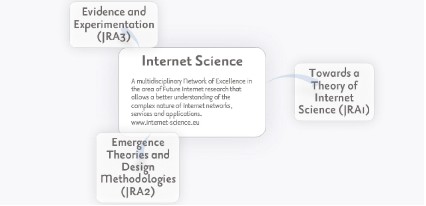The new Network of Excellence in Internet Science will bring together dozens of institutions from across many perspectives to form the basis for a new way of understanding the Internet and its ramifications across society and culture

The evolution of the Internet is increasingly intertwined with that of human societies, and yet there is as yet little understanding of this new technology and its ramifications across all areas of life, including its social, economic, environmental and political aspects. As a step toward a more holistic understanding of the Internet, Institute IMDEA Networks has announced its participation in the new EU-funded Network of Excellence in Internet Science (EINS), launching in December 2011 and continuing through May 2015. EINS aims to develop an integrated and interdisciplinary scientific understanding of the Internet and its co-evolution with society by enabling an open dialogue between all disciplines studying Internet networks from any technological or humanistic perspective — disciplines which are themselves being transformed by advances in the Internet's functionality. The network brings together more than thirty research institutions across Europe focusing on network engineering, computation, complexity, networking, security, mathematics, physics, sociology, game theory, economics, political sciences, humanities, and law, as well as other relevant social and life sciences. By bringing together a critical mass of resources and expertise it aims to deliver a durable structure for the way Internet research is carried out and to inform future technological, social and political choices around the Internet.
A Network of Excellence is an instrument designed by the EU to tackle the fragmentation of European research by creating a durable, cross-disciplinary structure that can form the basis for future research. As such, EINS will coordinate the multi-disciplinary investigation of specific Internet-related topics at the intersection of humanistic sciences, and technological sciences and environmental studies, such as privacy and identity, reputation, virtual communities, security and resilience and network neutrality. It will lay the scientific and methodological foundations for the development of a holistic Internet Science aiming in particular at an understanding of the "network effect" on human societies and organizations, as well as technological, economic, environmental and social aspects. Finally, it will provide concrete incentives for individual researchers and academic institutions to conduct cross-disciplinary studies. These will take the form of online journals, conferences, workshops, PhD courses, schools, contests, researchers' exchanges, and open calls for innovative activities in this direction.
EINS will bring together partners from across the world as well as from across many disciplines, including institutions from the United States, China, South Korea and Australia, as well as EU member states such as Italy, France, Switzerland, Spain, Great Britain, Greece, the Netherlands, Sweden, Germany, Belgium, Norway and Slovenia. The network is funded under the European Commission's Seventh Framework Program: Information and Communication Technologies. Institute IMDEA Networks' previous effort to scientifically capture this new holistic and multi-disciplinary vision of the Internet as both technological and societal artifact includes the Institute's Third Annual Workshop, held on May 18th, 2011, and coordinated by Dr. Sergey Gorinsky, Senior Researcher who is also leading the Institute’s work in EINS. The Workshop was devoted to the formulation of an Internet Science, with a focus on social networking.

The basic structure of EINS' work toward an Internet Science.

The network is funded under the European Commission's Seventh Framework Program: Information and Communication Technologies.
Read more:


